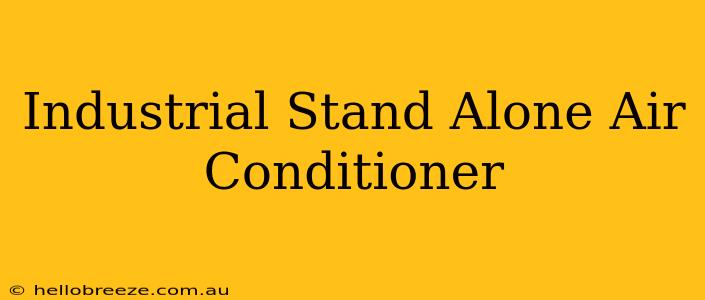Finding the perfect industrial stand alone air conditioner can feel overwhelming. With so many options available, understanding your needs and the features available is crucial. This guide breaks down everything you need to know to choose the right system for your industrial space.
Understanding Your Cooling Needs
Before diving into specific models, assess your space's requirements. Consider these key factors:
- Square Footage: The size of the area you need to cool directly impacts the BTU (British Thermal Unit) rating of the air conditioner you'll need. Larger spaces require higher BTU units.
- Ceiling Height: Higher ceilings mean the air conditioner needs to work harder to cool the space effectively.
- Insulation: Well-insulated buildings require less powerful air conditioners.
- Number of Occupants: More people in the space generate more heat, demanding a higher BTU rating.
- Equipment Generating Heat: Machinery and equipment significantly impact the cooling load. Consider the heat output of your industrial processes.
- Climate: The external temperature and humidity levels influence the cooling requirements. Hotter and more humid climates necessitate more powerful units.
Types of Industrial Stand Alone Air Conditioners
Several types of industrial stand alone air conditioners cater to different needs:
1. Packaged Air Conditioners:
These are self-contained units, typically located outside the building, that offer a complete cooling solution. They are easy to install and maintain, making them popular for various industrial settings. They are often chosen for their durability and efficiency.
2. Split System Air Conditioners:
These systems consist of an outdoor unit (condenser) and an indoor unit (evaporator). The units are connected by refrigerant lines. Split systems are ideal for larger spaces where distributing cool air efficiently is crucial. Many appreciate their flexibility in installation and quiet operation.
3. Rooftop Air Conditioners:
Designed for mounting on a building's roof, these units are a common choice for commercial and industrial applications. Their placement maximizes space efficiency within the building and makes them ideal for larger scale cooling needs.
Key Features to Consider
When selecting your industrial stand alone air conditioner, consider these important features:
- BTU Rating: As mentioned earlier, this dictates the cooling capacity. Choose a unit with a BTU rating appropriate for your space.
- Energy Efficiency: Look for units with high SEER (Seasonal Energy Efficiency Ratio) ratings for cost savings.
- Refrigerant Type: Consider environmentally friendly refrigerants.
- Noise Levels: Industrial settings can be noisy; however, choosing a quieter unit improves the working environment.
- Durability & Reliability: Invest in a robust system built to withstand harsh industrial conditions.
- Maintenance Access: Easy access to filters and components simplifies maintenance and reduces downtime.
Installation and Maintenance
Proper installation is crucial for optimal performance and longevity. Professional installation guarantees efficient operation and avoids potential issues. Regular maintenance, including filter changes and inspections, extends the life of your system and ensures consistent cooling.
Choosing the Right Industrial Stand Alone Air Conditioner for You
Selecting the right industrial stand alone air conditioner involves carefully considering your specific needs. By analyzing your space's requirements and the features of different systems, you can make an informed decision that ensures a comfortable and productive working environment. Remember to consult with HVAC professionals for personalized recommendations and guidance. They can assist in determining the best solution based on your unique industrial environment.

